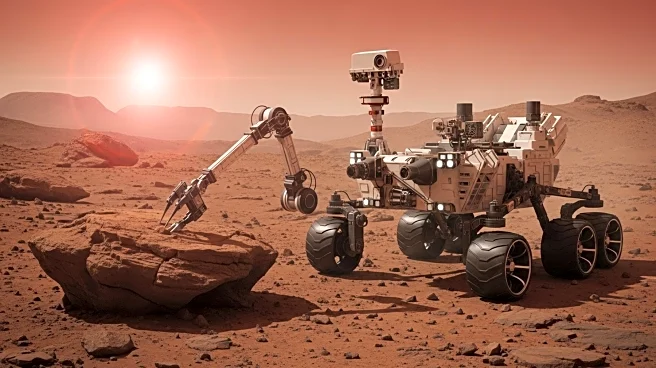What is the story about?
What's Happening?
The European Space Agency's (ESA) upcoming Mars rover mission, Rosalind Franklin, is poised to explore the clay-rich Oxia Planum region on Mars, potentially uncovering ancient organic material. Recent studies presented at the Joint Meeting of the Europlanet Science Congress and the Division for Planetary Science suggest that natural processes at the landing site may enhance the rover's ability to detect organic compounds. Dr. Aleksandra Sokołowska's study identified 258 rockfalls in the area, which may expose subsurface materials, increasing the diversity of samples the rover can collect. Additionally, Ananya Srivastava's research highlights layered clay deposits that could preserve organic materials, offering insights into ancient Martian climatic conditions. The rover, equipped with a drill capable of reaching depths of over six feet, is scheduled to launch in 2028 after previous delays.
Why It's Important?
The potential discovery of organic molecules on Mars by the Rosalind Franklin rover could significantly advance our understanding of life beyond Earth. The mission's success would provide critical insights into the planet's geological history and its capacity to support life. This exploration could influence future Mars missions and the search for extraterrestrial life, impacting scientific research and space exploration strategies. The findings may also contribute to broader discussions on planetary habitability and the conditions necessary for life, affecting public interest and policy decisions related to space exploration.
What's Next?
The Rosalind Franklin rover is set to launch in 2028, following years of setbacks, including the termination of NASA's partnership and Russia's withdrawal due to geopolitical tensions. As the mission progresses, scientists and stakeholders will closely monitor the rover's findings, which could lead to further exploration initiatives on Mars. The results may prompt international collaborations and funding opportunities to expand the search for life on other planets, potentially influencing future space missions and technological advancements in planetary exploration.
Beyond the Headlines
The mission's implications extend beyond scientific discovery, touching on ethical and philosophical questions about humanity's place in the universe. The search for life on Mars challenges our understanding of life's uniqueness and raises questions about the ethical considerations of exploring and potentially colonizing other planets. The mission also highlights the importance of international cooperation in space exploration, as geopolitical factors can significantly impact scientific progress and collaboration.















